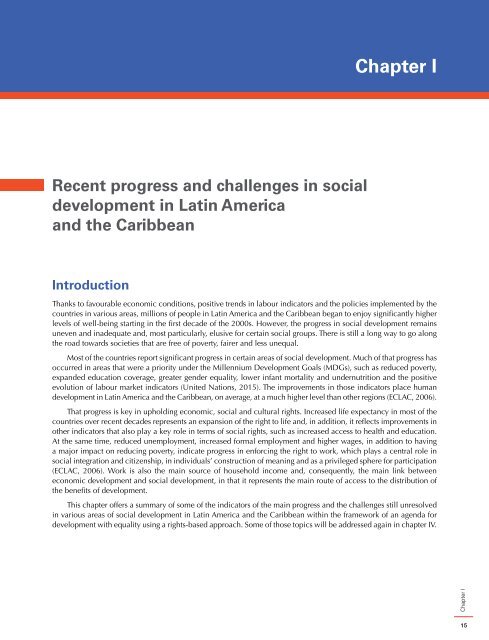Inclusive social development: The next generation of policies for overcoming poverty and reducing inequality in Latin America and the Caribbean
The Latin American and Caribbean region has achieved notable social development in the past decade. However, much remains to be done. The persisting challenges of defeating poverty once and for all and significantly reducing inequality are not only ethical imperatives but also conditions for making progress toward sustainable development, consistently with the recently adopted 2030 Agenda for Sustainable Development. Although the global economy is more complex and uncertain now than in previous years, and prospects for the region are not —in the short term, at least— particularly bright, it is crucial to secure the progress made in social development in the past decade and lose no time in tackling unresolved issues in areas where progress has been insufficient.
The Latin American and Caribbean region has achieved notable social development in the past decade. However, much remains to be done. The persisting challenges of defeating poverty once and for all and significantly reducing inequality are not only ethical imperatives but also conditions for making progress toward sustainable development, consistently with the recently adopted 2030 Agenda for Sustainable Development.
Although the global economy is more complex and uncertain now than in previous years, and prospects for the region are not —in the short term, at least— particularly bright, it is crucial to secure the progress made in social development in the past decade and lose no time in tackling unresolved issues in areas where progress has been insufficient.
You also want an ePaper? Increase the reach of your titles
YUMPU automatically turns print PDFs into web optimized ePapers that Google loves.
<strong>Inclusive</strong> <strong>social</strong> <strong>development</strong>: <strong>the</strong> <strong>next</strong> <strong>generation</strong> <strong>of</strong> <strong>policies</strong> <strong>for</strong> <strong>overcom<strong>in</strong>g</strong> <strong>poverty</strong>...<br />
Chapter I<br />
Recent progress <strong>and</strong> challenges <strong>in</strong> <strong>social</strong><br />
<strong>development</strong> <strong>in</strong> Lat<strong>in</strong> <strong>America</strong><br />
<strong>and</strong> <strong>the</strong> <strong>Caribbean</strong><br />
Introduction<br />
Thanks to favourable economic conditions, positive trends <strong>in</strong> labour <strong>in</strong>dicators <strong>and</strong> <strong>the</strong> <strong>policies</strong> implemented by <strong>the</strong><br />
countries <strong>in</strong> various areas, millions <strong>of</strong> people <strong>in</strong> Lat<strong>in</strong> <strong>America</strong> <strong>and</strong> <strong>the</strong> <strong>Caribbean</strong> began to enjoy significantly higher<br />
levels <strong>of</strong> well-be<strong>in</strong>g start<strong>in</strong>g <strong>in</strong> <strong>the</strong> first decade <strong>of</strong> <strong>the</strong> 2000s. However, <strong>the</strong> progress <strong>in</strong> <strong>social</strong> <strong>development</strong> rema<strong>in</strong>s<br />
uneven <strong>and</strong> <strong>in</strong>adequate <strong>and</strong>, most particularly, elusive <strong>for</strong> certa<strong>in</strong> <strong>social</strong> groups. <strong>The</strong>re is still a long way to go along<br />
<strong>the</strong> road towards societies that are free <strong>of</strong> <strong>poverty</strong>, fairer <strong>and</strong> less unequal.<br />
Most <strong>of</strong> <strong>the</strong> countries report significant progress <strong>in</strong> certa<strong>in</strong> areas <strong>of</strong> <strong>social</strong> <strong>development</strong>. Much <strong>of</strong> that progress has<br />
occurred <strong>in</strong> areas that were a priority under <strong>the</strong> Millennium Development Goals (MDGs), such as reduced <strong>poverty</strong>,<br />
exp<strong>and</strong>ed education coverage, greater gender equality, lower <strong>in</strong>fant mortality <strong>and</strong> undernutrition <strong>and</strong> <strong>the</strong> positive<br />
evolution <strong>of</strong> labour market <strong>in</strong>dicators (United Nations, 2015). <strong>The</strong> improvements <strong>in</strong> those <strong>in</strong>dicators place human<br />
<strong>development</strong> <strong>in</strong> Lat<strong>in</strong> <strong>America</strong> <strong>and</strong> <strong>the</strong> <strong>Caribbean</strong>, on average, at a much higher level than o<strong>the</strong>r regions (ECLAC, 2006).<br />
That progress is key <strong>in</strong> uphold<strong>in</strong>g economic, <strong>social</strong> <strong>and</strong> cultural rights. Increased life expectancy <strong>in</strong> most <strong>of</strong> <strong>the</strong><br />
countries over recent decades represents an expansion <strong>of</strong> <strong>the</strong> right to life <strong>and</strong>, <strong>in</strong> addition, it reflects improvements <strong>in</strong><br />
o<strong>the</strong>r <strong>in</strong>dicators that also play a key role <strong>in</strong> terms <strong>of</strong> <strong>social</strong> rights, such as <strong>in</strong>creased access to health <strong>and</strong> education.<br />
At <strong>the</strong> same time, reduced unemployment, <strong>in</strong>creased <strong>for</strong>mal employment <strong>and</strong> higher wages, <strong>in</strong> addition to hav<strong>in</strong>g<br />
a major impact on <strong>reduc<strong>in</strong>g</strong> <strong>poverty</strong>, <strong>in</strong>dicate progress <strong>in</strong> en<strong>for</strong>c<strong>in</strong>g <strong>the</strong> right to work, which plays a central role <strong>in</strong><br />
<strong>social</strong> <strong>in</strong>tegration <strong>and</strong> citizenship, <strong>in</strong> <strong>in</strong>dividuals’ construction <strong>of</strong> mean<strong>in</strong>g <strong>and</strong> as a privileged sphere <strong>for</strong> participation<br />
(ECLAC, 2006). Work is also <strong>the</strong> ma<strong>in</strong> source <strong>of</strong> household <strong>in</strong>come <strong>and</strong>, consequently, <strong>the</strong> ma<strong>in</strong> l<strong>in</strong>k between<br />
economic <strong>development</strong> <strong>and</strong> <strong>social</strong> <strong>development</strong>, <strong>in</strong> that it represents <strong>the</strong> ma<strong>in</strong> route <strong>of</strong> access to <strong>the</strong> distribution <strong>of</strong><br />
<strong>the</strong> benefits <strong>of</strong> <strong>development</strong>.<br />
This chapter <strong>of</strong>fers a summary <strong>of</strong> some <strong>of</strong> <strong>the</strong> <strong>in</strong>dicators <strong>of</strong> <strong>the</strong> ma<strong>in</strong> progress <strong>and</strong> <strong>the</strong> challenges still unresolved<br />
<strong>in</strong> various areas <strong>of</strong> <strong>social</strong> <strong>development</strong> <strong>in</strong> Lat<strong>in</strong> <strong>America</strong> <strong>and</strong> <strong>the</strong> <strong>Caribbean</strong> with<strong>in</strong> <strong>the</strong> framework <strong>of</strong> an agenda <strong>for</strong><br />
<strong>development</strong> with equality us<strong>in</strong>g a rights-based approach. Some <strong>of</strong> those topics will be addressed aga<strong>in</strong> <strong>in</strong> chapter IV.<br />
Chapter I<br />
15


















